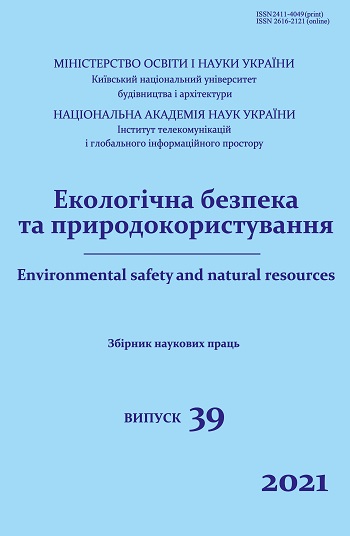Expert assessment method of capabilities civil defense forces
DOI:
https://doi.org/10.32347/2411-4049.2021.3.88-101Keywords:
civil defense, expert decisions, multicriteria, capabilities, ontology, votingAbstract
The article proposes an approach to expert assessment of the capabilities of civil defense forces in multicriteria tasks. To implement the approach, taking into account the specifics of the subject area, the possibility of a method of supporting expert decisions, which combines the use of ontologies, voting procedures of experts, and relevant calculation procedures. The general scheme of the environment for making expert decisions on assessing the capabilities of civil defense forces on the example of emergency rescue formation is given. It is shown that the main normative sources for decision-making on capacity assessment are the catalog of basic components of capabilities and the list of criteria for their assessment. The choice is made from three alternatives – ready for action as intended, limited ready, or not ready. The problem of capacity assessment was set, a variant of the scale of quantitative characteristics of capabilities, and the level of expert assessment was proposed. The correct choice of the voting procedure of experts is substantiated, which contributes to finding an agreed solution. It is determined that to ensure high-quality elaboration of the task hierarchy, control, and increase the objectivity of the formation of characteristic vectors, the subject area must be presented in the form of an ontological information model. Attributive descriptions (properties) of the criteria are presented in the ontological database in the form of frames, the slots of which contain the corresponding numerical or linguistic data. Appropriate computer web tools have been proposed to support remote access capability assessment technology.
References
Sukhodolia, O.M. (2019). Adaptation of the national security system to the challenges of time: formation of mechanisms to ensure national stability. In Development of civil defense in modern security conditions: Proceedings of the 21st All-Ukrainian scientific-practical conference (with international participation) (pp. 260-271). Electronic edition of combined use. Kyiv: IDUСZ [in Ukrainian].
Pavlikovskyi, A. et al. (2020). Defense reform: a systematic approach to defense management: a monograph. (A. Syrotenko, Ed.). Kyiv: NUOU [in Ukrainian].
Korobkin, V.F., & Sliusar, A.A. (2020). Capabilities in the field of civil protection: search for a categorical-conceptual apparatus. Scientific Bulletin: Tsyvilnyi zakhyst ta pozhezhna bezpeka, 2(10), 61-68 [in Ukrainian].
Petrov, Е.H. et al. (2003). Methods and means of decision-making in socio-economic and technical systems. Kherson: Oldy-plius [in Russian].
Hnatiienko, H.M., & Snytiuk, V.Ie. (2008). Expert decision-making technologies: Monograph. Kyiv: TOV «Maklaut» [in Ukrainian].
Voronin, A.M., Ziatdinov, Yu.K., & Klymova, A.S. (2009). Information systems for decision making. Kyiv: Vyd-vo «NAU-druk» [in Ukrainian].
Saaty, T. (1993). Decision making. Analytic Hierarchy Process. Moskva: Radyo y sviaz [in Russian].
Snityuk, V.E. Bychenko, A.A., & Dzhulay, A.N. (2008). Evolutionary technologies of decision-making in firefighting: a monograph. (A.A. Timchenko, Ed.). Cherkassy: Maklaut [in Russian].
Nesterenko, O., Netesin, I., Polischuk, V., & Trofymchuk, O. (2020). Development of a procedure for expert estimation of capabilities in defense planning under multicriterial conditions. Eastern-European Journal of Enterprise Technologies, 4/2(106), 33-43. DOI: https://doi.org/10.15587/1729-4061.2020.208603
Palagin, A.V., & Petrenko, N.G. (2007). On the issue of system-ontological integration of subject area knowledge. Matematicheskie mashinyi i sistemyi, 3,4, 63-75 [in Russian].
Stryzhak, O.Ie. (2013). Means of ontological integration and support of distributed spatial and semantic information resources. Ekolohichna bezpeka ta pryrodokorystuvannia, 12, 166-178 [in Ukrainian]. 12. Nesterenko, O.V. (2019). Ontologically controlled information systems in administrative management. Matematychne modeliuvannia v ekonomitsi, 2(15), 57-68. DOI: https://doi.org/10.35350/2409-8876-2019-15-2-58-69 [in Ukrainian].
Lytvyn, V.V. (2011). Knowledge base of intelligent decision support systems. Lviv: Vydavnytstvo Lvivskoi politekhniky [in Ukrainian].
Polishchuk, V.B., Netesin, I.Ie., & Nesterenko, O.V. (2019). Information technologies in defense resources management: methodological context and examples of practical implementation. Part 1: Monograph. (V.B. Polishchuk, Ed.). Kyiv: UkrNС RIT [in Ukrainian].
Downloads
Published
How to Cite
Issue
Section
License
Copyright (c) 2021 Oleksandr V. Nesterenko

This work is licensed under a Creative Commons Attribution 4.0 International License.
The journal «Environmental safety and natural resources» works under Creative Commons Attribution 4.0 International (CC BY 4.0).
The licensing policy is compatible with the overwhelming majority of open access and archiving policies.

